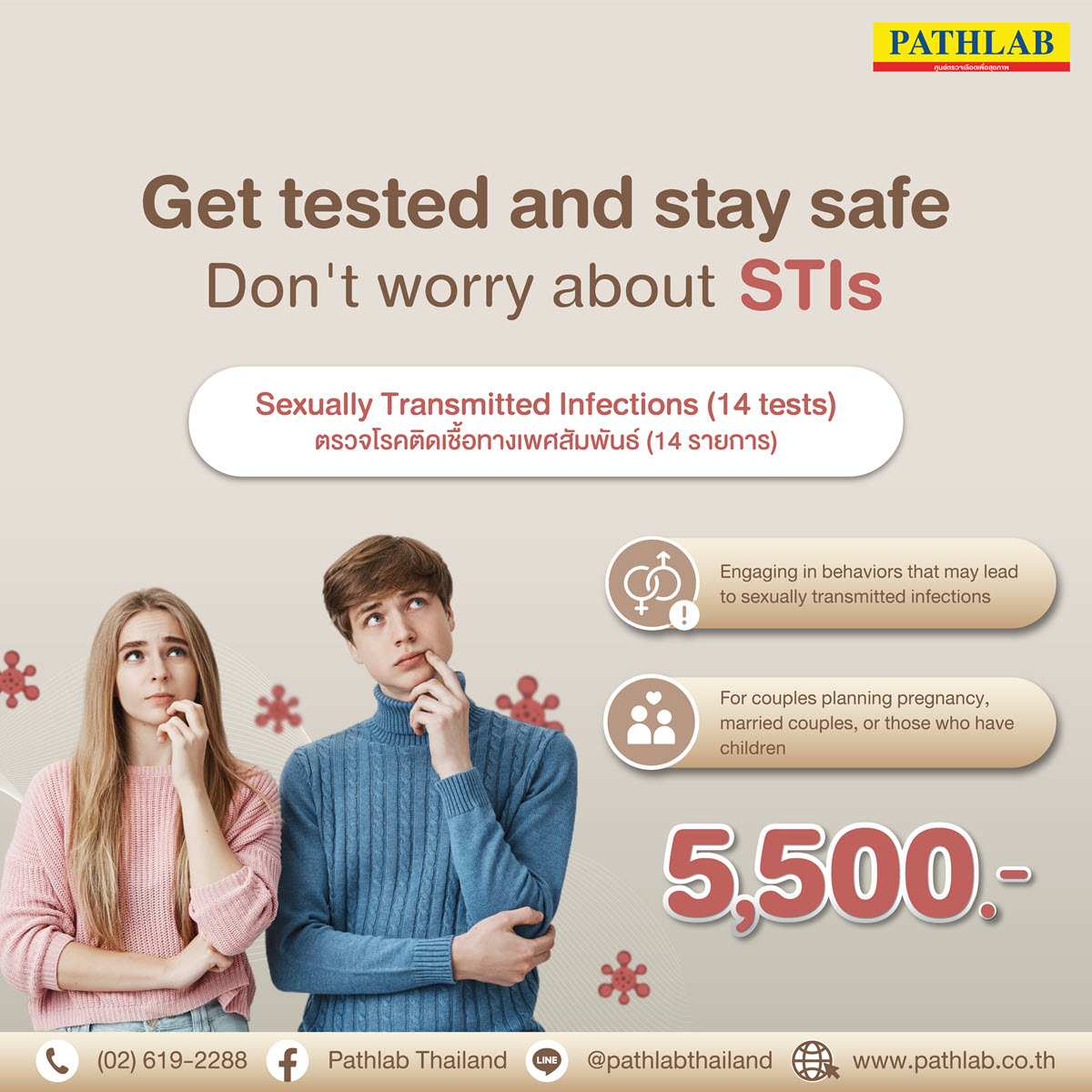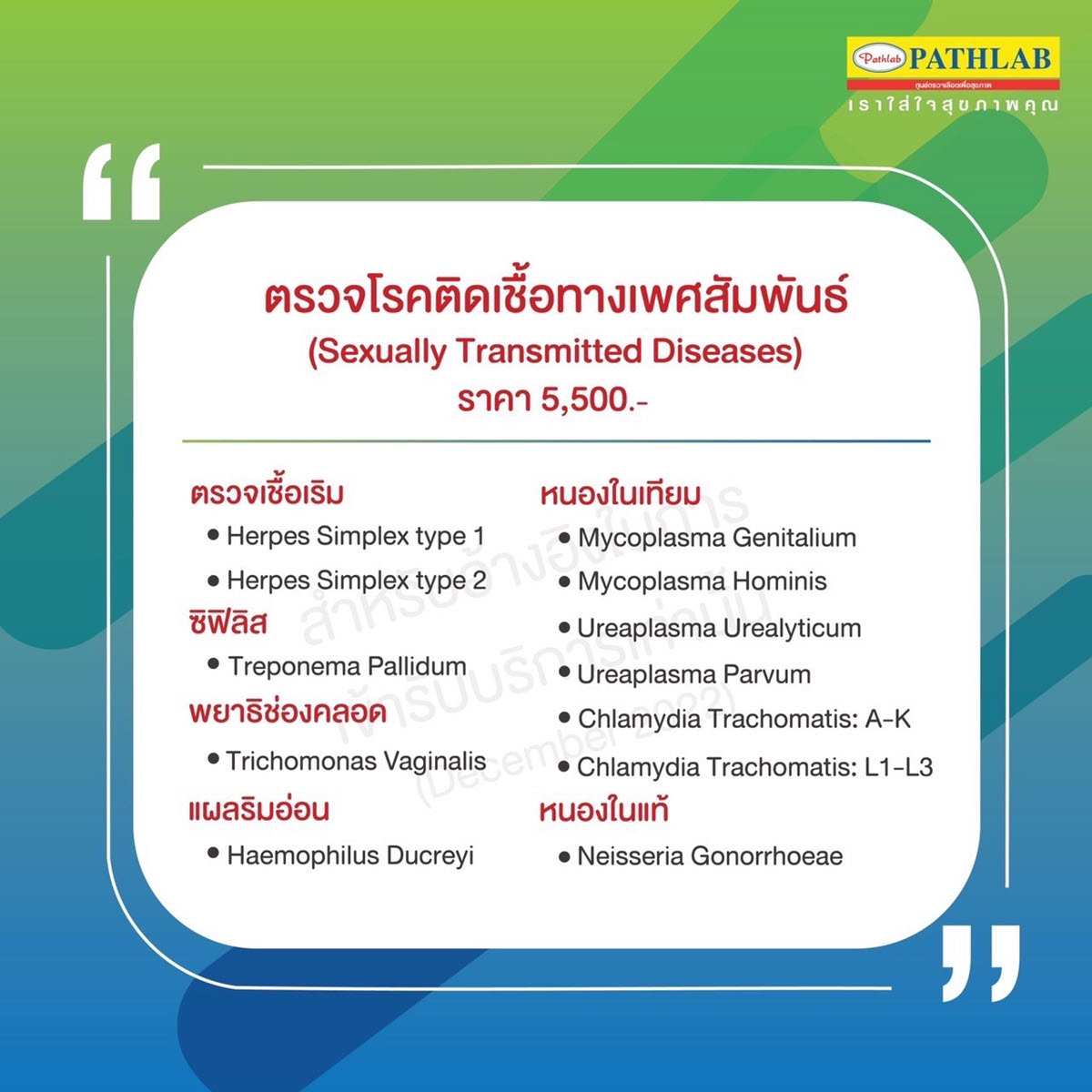STIs Screening Test
Get reliable and confidential STIs screening test at PATHLAB Healthcare Center
We provide a private and confidential STIs testing and treatment in Bangkok
Sexually Transmitted Infections (STIs) and Sexually Transmitted Diseases (STDs)
Sexually Transmitted Infections (STIs) are viruses, bacteria, fungi, or parasites that are transmitted through sexual contact. Sexually Transmitted Diseases (STDs) occur as a result of sexually transmitted infections, and this term implies that the infection has caused some symptoms or disease. Sometimes the terms are used interchangeably, but there is a distinction.
The primary goal of public health and healthcare is to prevent and treat infections before they develop into diseases. As a result, many organizations, including the CDC, use the term STI more frequently. However, the term STD is still used when referring to data or information from sources that use this terminology.
In summary, STIs are the infectious agents that can be transmitted sexually, while STDs refer to the diseases that can result from these infections. The focus has shifted more towards prevention and early treatment of STIs rather than just managing the resulting diseases.
There are different types of Sexually transmitted infections (STIs), including
- Bacteria : Gonorrhea, Chlamydia, Syphilis, Chancroid
- Viruses : Genital Herpes, Genital Warts, HIV, Hepatitis B, Hepatitis C
- Other pathogens : Trichomoniasis, Candidiasis, Pubic Lice
Who should get tested?
- STIs are transmitted through vaginal, oral, and anal sex. They can also be spread through close physical contact, such as touching.
- Limiting the number of sex partners. Reduce the risk of contracting an STI.
- Using quality condoms and dental dams provides substantial protection and reduces risk.
- Some sexual behaviors may higher risks than others. For Example, anal and oral sex pose higher risks because they can cause tears in delicate skin tissues and the anus or mouth, making it easier for infections to enter the body..
- Vaccines are available for some STIs, including the human papillomavirus (HPV) vaccine, which can reduce the risk of cervical cancer.
- Avoid smoking, eating, drinking or spending extended periods in public restrooms.
- If you are pregnant and have a sexually transmitted infection. Consult with your healthcare provider for treatment options to protect both you and your baby.
- Get STI tests regularly.


STIs Screening Tests
PATHLAB healthcare center provides private health consultations and blood tests. Based on your sexual history and lifestyle, specific tests may be recommended, including
- Anti Hepatitis C (HCVG)
- Chalamydia Trachomatis: A-K
- Chalamydia Trachomatis: L1-L3
- Haemophilus Ducreyi
- Harpes Simplex Type 1
- Harpes Simplex Type 2
- Hepatitis B Surface Antigen (HBSAG)
- Herpes Simples I & 2 IgG (HSV1 & 2G)
- HIV-1 and HIV-2
- HPV DNA Test
- Mycoplasma Genitalium
- Mycoplasma Hominis
- Neisseria Gonorrhoese
- Syphilis (VDRL)
- Trichomonas Vaginalis
- Treponema Pallidum
- Ureaplasma Parvum
- Ureaplasma Urealyticum
When to get tested
Annual testing for sexually transmitted infections (STIs) is recommended. More frequent testing, such as every 3 to 6 months,is advisable if you have multiple sexual partners. Testing is also advised before engaging in sexual activity with a new partner or following instances of unprotected sex or condom breakage. Regular testing aids in the early detection and treatment of STIs, including those that may not present noticeable symptoms.
Symptoms that should not be ignored include :
- Bumps, rashes, or sores in the genital area.
- Painful or burning urination.
- Abnormal vaginal discharge for women and abnormal semen volume for men.
What to do if your test result is positive
- Seek treatment promptly from your healthcare provider. If you receive a positive STI test result.
- Notify any recent sexual partners about your diagnosis to prevent further transmission and ensure they receive timely treatment.
- Use condoms consistently during sexual intercourse and avoid engaging in anal or oral sex until treatment is complete.
During your treatment
- Follow all medications prescribed by your healthcare provider.
- Abstain from sexual activity while undergoing treatment. Wait until your healthcare provider confirms that you are clear and safe.
- Inform your sexual partners about your STI status so they can undergo testing and receive treatment if necessary.
- When you resume sexual activity, ensure you use condoms and dental dams for oral sex.
If left untreated
Untreated STIs can lead to serious health complications and additional medical conditions. For instance, certain STIs may adversely affect the reproductive systems of both males and females. Men may experience discomfort and swelling in the testicles, while women may develop pelvic inflammatory disease, potentially resulting in fertility issues or difficulties conceiving in the future. Neglecting treatment for these infections poses risks to your health and can lead to transmission to your sexual partners.
